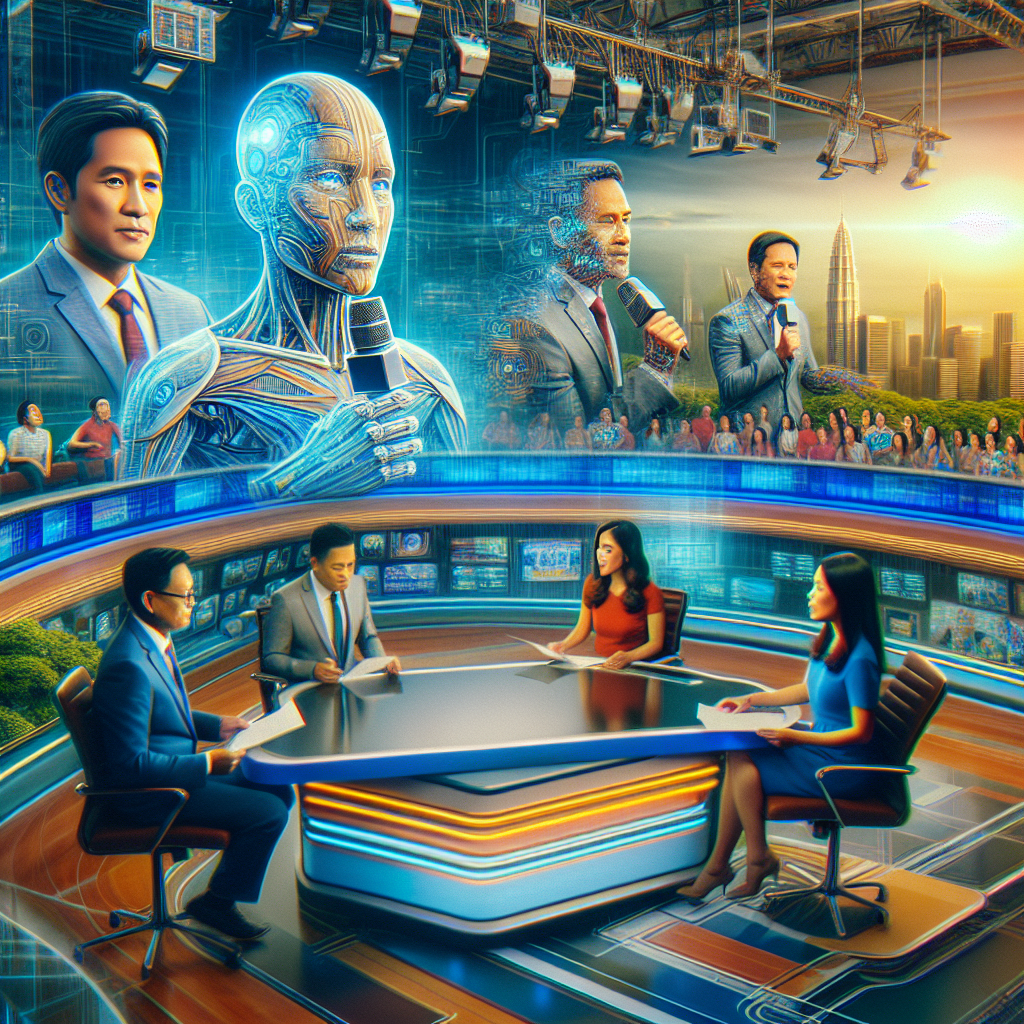‘Players aren’t automated, so why?’: Filipino sportscasters cry foul as AI presenters debut on local sports TV

Artificial Intelligence vs Human Emotion: The Impact on Sports Broadcasting
Filipino sportscasters are up in arms as artificial intelligence (AI) presenters make their debut on local sports TV. The introduction of AI presenters has sparked a debate about the role of technology in sports broadcasting and the impact it may have on the industry.
For years, sportscasters have been the face and voice of sports broadcasts, providing commentary, analysis, and insight into the games. Their passion, emotion, and knowledge of the sport have endeared them to viewers and made them an integral part of the sports viewing experience. However, with the advancement of AI technology, some networks are now turning to AI presenters to deliver sports news and analysis.
The use of AI presenters raises questions about the role of human emotion in sports broadcasting. Can AI presenters convey the same level of passion and excitement as human sportscasters? Will viewers connect with AI presenters in the same way they do with human presenters? These are just some of the concerns that Filipino sportscasters have raised in response to the introduction of AI presenters.
One of the main arguments against AI presenters is that they lack the human touch that sportscasters bring to the table. Human sportscasters are able to convey emotion, empathy, and excitement in a way that AI presenters simply cannot replicate. Their ability to connect with viewers on a personal level and share in the highs and lows of the game is what sets them apart from AI presenters.
Furthermore, human sportscasters have the ability to adapt to unexpected events and provide real-time analysis and commentary. They can react to game-changing plays, injuries, and controversies in a way that AI presenters cannot. Their spontaneity and ability to think on their feet make them invaluable assets to sports broadcasts.
In addition, human sportscasters bring a level of expertise and insight that AI presenters may lack. Their years of experience in the industry, combined with their passion for the sport, allow them to provide in-depth analysis and commentary that AI presenters may struggle to match. Viewers value the knowledge and expertise that human sportscasters bring to the table, and losing that human element could diminish the overall quality of sports broadcasts.
Despite these concerns, some networks argue that AI presenters offer a more cost-effective and efficient solution for sports broadcasting. AI presenters can work around the clock, delivering news updates and analysis in real-time without the need for breaks or rest. They can also be programmed to deliver information in multiple languages, making them a versatile option for international broadcasts.
While AI presenters may offer some benefits in terms of efficiency and cost-effectiveness, they cannot replace the human emotion and connection that sportscasters bring to sports broadcasts. Viewers tune in to sports broadcasts not just for the game itself, but for the commentary, analysis, and insight that human sportscasters provide. The passion, excitement, and expertise that human sportscasters bring to the table are irreplaceable, and networks should consider the impact that AI presenters may have on the overall viewing experience.
In conclusion, the introduction of AI presenters on local sports TV has sparked a debate about the role of technology in sports broadcasting and the impact it may have on the industry. While AI presenters offer some benefits in terms of efficiency and cost-effectiveness, they cannot replicate the human emotion, passion, and expertise that human sportscasters bring to sports broadcasts. Filipino sportscasters are right to cry foul at the introduction of AI presenters, as they play a vital role in connecting with viewers and enhancing the overall sports viewing experience. It is important for networks to consider the impact that AI presenters may have on the industry and to prioritize the human element in sports broadcasting.
The Future of Sports Commentary: AI vs Human Analysts

In a world where technology continues to advance at a rapid pace, it comes as no surprise that artificial intelligence (AI) is making its way into various industries, including sports broadcasting. Recently, Filipino sportscasters have expressed their concerns as AI presenters have made their debut on local sports TV. This development has sparked a debate about the future of sports commentary: AI versus human analysts.
The introduction of AI presenters in sports broadcasting raises questions about the role of human analysts in the industry. While AI technology has the potential to provide real-time statistics and analysis, many argue that it lacks the human touch and emotional connection that human analysts bring to the table. Filipino sportscasters have voiced their concerns about being replaced by AI presenters, highlighting the unique insights and perspectives that human analysts can offer.
One of the main arguments against AI presenters is the lack of authenticity and personality that they bring to sports commentary. Human analysts are able to provide a personal touch to their commentary, drawing on their own experiences and emotions to connect with viewers. This human element is what sets human analysts apart from AI presenters, who are programmed to deliver information in a robotic and impersonal manner.
Furthermore, human analysts have the ability to adapt to changing situations and provide insightful commentary in real-time. They can analyze plays, strategies, and player performances with a level of depth and nuance that AI presenters may struggle to match. Human analysts also have the advantage of being able to engage with viewers on a more personal level, creating a sense of connection and camaraderie that is difficult to replicate with AI technology.
Despite the concerns raised by Filipino sportscasters, some argue that AI presenters have the potential to enhance the viewing experience for sports fans. AI technology can provide real-time statistics, analysis, and insights that human analysts may not be able to deliver as quickly or accurately. AI presenters can also help streamline the production process, allowing for faster and more efficient delivery of sports commentary.
However, it is important to consider the implications of relying too heavily on AI technology in sports broadcasting. While AI presenters may be able to provide valuable information and analysis, they lack the emotional intelligence and personal touch that human analysts bring to the table. The human element of sports commentary is what makes it engaging and relatable for viewers, and it is important not to lose sight of this in the pursuit of technological advancement.
In conclusion, the debate over AI versus human analysts in sports commentary is a complex and nuanced issue. While AI technology has the potential to enhance the viewing experience for sports fans, it is important to recognize the unique insights and perspectives that human analysts bring to the table. Filipino sportscasters have raised valid concerns about the impact of AI presenters on the industry, highlighting the importance of preserving the human element of sports commentary. As technology continues to evolve, it will be interesting to see how the role of human analysts in sports broadcasting adapts to meet the demands of an increasingly digital world.
Balancing Technology and Tradition in Sports Broadcasting: The Role of AI Presenters
In the fast-paced world of sports broadcasting, technology continues to play a significant role in shaping the way fans consume their favorite games. From high-definition cameras to instant replays, advancements in technology have revolutionized the way we experience sports. However, the recent introduction of artificial intelligence (AI) presenters on local sports TV has sparked a debate among Filipino sportscasters.
Traditionally, sports broadcasting has been a human-driven industry, with commentators and analysts providing insights, analysis, and commentary on live games. These individuals bring a level of emotion, passion, and expertise that AI presenters simply cannot replicate. The human element is what sets sports broadcasting apart from other forms of media and creates a connection between fans and the game.
Filipino sportscasters have expressed concerns about the use of AI presenters, arguing that they lack the ability to convey the same level of excitement and emotion that human presenters bring to the table. They believe that AI presenters are unable to capture the nuances of the game, such as the tension in a close match or the jubilation of a last-minute goal. As a result, they fear that the use of AI presenters could diminish the overall viewing experience for fans.
Despite these concerns, proponents of AI presenters argue that they offer several advantages over human presenters. AI presenters are capable of processing vast amounts of data in real-time, providing viewers with instant statistics, analysis, and insights. They can also be programmed to deliver consistent and unbiased commentary, free from the influence of personal biases or emotions.
Furthermore, AI presenters have the potential to revolutionize sports broadcasting by providing a more personalized viewing experience for fans. By analyzing viewer preferences and behavior, AI presenters can tailor their commentary to cater to individual interests, creating a more engaging and interactive experience for viewers.
While the debate over the use of AI presenters in sports broadcasting continues, it is clear that finding a balance between technology and tradition is essential. The integration of AI presenters should complement, rather than replace, human presenters, allowing for a seamless and cohesive viewing experience for fans.
As technology continues to evolve, it is important for sports broadcasters to adapt and embrace new innovations while also preserving the unique qualities that make sports broadcasting special. By striking a balance between technology and tradition, sports broadcasters can ensure that they continue to deliver high-quality content that resonates with fans.
In conclusion, the introduction of AI presenters on local sports TV has sparked a debate among Filipino sportscasters. While some argue that AI presenters lack the ability to convey the same level of excitement and emotion as human presenters, others believe that they offer several advantages, such as real-time data analysis and personalized viewing experiences. Finding a balance between technology and tradition is essential in ensuring that sports broadcasting continues to evolve and provide fans with an engaging and immersive viewing experience.

